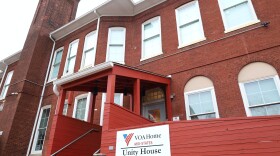Just south of Louisville’s Broadway corridor, opportunity awaits on a two-acre lot.
The Smoketown property, formerly owned by the manufacturer of Louisville Slugger bats, sits between Preston and Jackson Streets. Its paved surface is closed in by a chain-link fence, where litter and plants meet in distress. Townhouses, apartments and businesses surround the large and empty lot.
But change may be on the way. The site’s western half is where a new community land trust is looking to build affordable housing, promoting home-ownership in a historically Black neighborhood where lawmakers and residents are concerned about the potential of displacement.
Community land trusts are nonprofits that purchase land and develop property on it. They typically sell homes to occupants while leasing them the land below, and create resale restrictions meant to preserve affordability for the next occupants. The model aims to keep prices stable and offer owners an opportunity to build wealth.
“The biggest part of the community land trust is to make sure that the house itself is not just affordable for that one family, but how can that house actually be affordable for multiple generations to come,” said Jason Webb, an expert on community land trusts.
In 2019, a housing needs assessment issued by Louisville Metro Government found considerable gaps in affordable housing, especially for residents making 50% or below the area median income, which is $44,850 for a Louisville family of four in January 2024.
The report recommended the city work to establish community land trusts, following in the footsteps of nearby cities like Lexington and Cincinnati.
The next year, Louisville awarded REBOUND, Inc., a nonprofit housing developer, a contract to help establish a community land trust and build at least 10 affordable units with it. Then, in 2022, the group was gifted one acre of the Smoketown lot for that effort.
Kevin Dunlap, REBOUND’s president and CEO, said since his organization earned the city contract, it’s worked in the Smoketown and Russell neighborhoods to promote the idea of community land trusts. That’s involved organizing residents to help establish the nonprofits.
“We’re in a period where people literally can’t afford to live in the neighborhoods that they grew up in,” Dunlap said.
While efforts in Russell aren’t complete yet, Dunlap said the Smoketown Community Land Trust was officially launched in December with a board of directors. The trust’s president, Shavonda Stoner, was not available to provide comment for this story.
Dunlap said the trust has identified six properties to redevelop so far, with REBOUND ready to transfer the Smoketown lot acre to it once it gains tax-exempt status as a nonprofit.
Louisville Metro Government agreed to give REBOUND $2.1 million in federal Community Development Block Grants for acquiring, building and rehabbing property to become affordable housing.
Dunlap said around $1.6 million is reserved for developing units in Smoketown and Russell, while the rest is for community engagement to establish the land trusts.
“A lot of the work, at least for the first year-and-a-half to two years, was basically getting the people on board in those neighborhoods,” Dunlap said.
Caitlin Bowling, a spokesperson for the city’s economic development agency, said in an email that REBOUND has withdrawn $99,000 from the fund so far.
Grounded Solutions Network, a national organization that promotes shared equity programs like community land trusts, has worked in Louisville since the 2019 housing report to spur the current effort: first to teach city officials about how land trusts work, then to partner with REBOUND to explain the model to residents.
Webb, the organization’s community and technical assistance principal, spent time in Louisville to help with the effort. He said the group met with people at places like churches and soup kitchens to get them on board with the idea.
He added that efforts in Smoketown have moved along over the past year, through conversations on how the community land trust would operate.
“[We] have been in top gear of really getting through the material, really debating and really thinking about the options,” Webb said.
Webb said that while community land trusts have existed as a model for about 50 years, over the past decade they’ve increased in popularity across the United States. A June report co-authored by Grounded Solutions Network researchers found the estimated number of shared equity homes, including as part of trusts, in the U.S. rose from about 7,100 to around 15,600 from 2011-22.
They predominantly aim to provide housing for residents making at or below 80% of the area’s median income, according to Webb.
“We actually have a fair number of community land trusts throughout the country that are also going into the rental space,” he said. “So they're able to get even lower into that AMI… for folks that just may not be ready for that home-ownership jump.”





